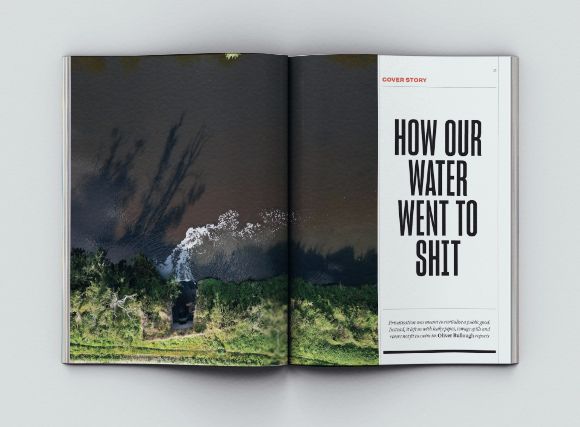Water we’re waiting for
We broadly agree with Oliver Bullough’s analysis of the water sector in England and Wales (“How our water went to shit”, Summer Special), but firmly disagree that “sorting out the mess… will be complicated, controversial and ruinously expensive”. In our review of the sector, we found a workable solution—to shift to a publicly owned and democratised water system.
First, it would not be overly complicated. There is a rich body of experience from other countries—including France, Germany and the US—where water has been taken into the public domain, resulting in better outcomes and providing tested policies, processes and mechanisms that could be adapted for England and Wales.
Second, it is not controversial. Recent opinion polls show 82 per cent of people agreed that water should be in public ownership, and parliament’s Environment, Food and Rural Affairs Committee has recommended the government fully considers the potential for public ownership. A public system could include greater citizen involvement and democratic accountability and help create a water-conscious society.
Finally, our report shows public ownership would not be ruinously expensive. The figure of £100bn seen in the news is based on a biased assessment. In law, the government must pay a fair value for a company, taking account of inadequate investment in infrastructure, dividends paid, debt and the cost of rectifying damage done under private ownership. For the worst-performing companies the value is likely to be close to zero.
There is a better future for the water sector in England and Wales. We must have the courage and ambition to reach for it.
Frances Cleaver, Becky Malby, Kate Bayliss & Ewan McGaughey, The People’s Commission on the Water Sector
The privatisation of water was based on a fantasy that companies would make profits through investment and quality improvement. But shareholders and their managerial allies found a shortcut to riches—piling water companies with debt to award themselves rising dividends and exploding pay, skimping on investment and landing a captive public with higher bills to fund it all.
Water companies shifted their business as a result: from physical engineering to financial engineering, from asset building to asset sweating, from investing to extracting. To take one example: barring the completion of Carsington Water in 1992, not a single major reservoir has been built since the sector was privatised in 1989, even though capacity rose steadily under public ownership. This has little to do with the planning system and -everything to do with the logic that privatisation embedded in the water sector. As Oliver Bullough meticulously details, the result of this is all around us. Sewage discharge out of control, rising bills, water bosses rewarded for failure and major water companies on the verge of collapse.
Enough. Britain can no longer afford to indulge in fantasies, if it ever could. The sooner we face up to reality—that privatisation of water has failed, that -muddling through is ultimately more costly and that public ownership is the most robust model to deliver change—the better: for the public and our water.
Mathew Lawrence, director of Common Wealth
Oliver Bullough skirts around the issue of financial engineering. There were multiple press reports about Macquarie charging interest on loans it had made to Thames Water. This is a basic financial engineering method, since the cost is tax-deductible to the borrower.
Unlike airlines, for example, which need to hedge their high fuel costs, what exactly are water companies using derivatives for? The latest Thames Water audit report draws attention to interest rate and credit risks. Is this all? Yorkshire Water reports using derivatives to hedge currency risk. Why does a water company need to incur currency risk? I would like to understand more about why water companies dabble in derivatives, but accounting standards do not seem to require disclosure of who the counterparties are, nor of any offsetting trades.
Has financial engineering allowed foreign owners to pick the pockets of the British people? We lack information. All techniques for owners extracting revenue from their possessions should be brought under control, for example by a strong People’s Council able to set its own agenda so that it can investigate and expose every new scheme, quickly. Allow fair returns, yes, but prevent exploitation.
David Kauders, Zug, Switzerland
Fake IDs
Your recent feature on digital ID cards (“Do we need identity cards?” Summer Special) highlights just how risky a costly misstep could be without proper scrutiny. Labour Together’s proposal for a mandatory digital credentials app—BritCard—may appear modern, but aside from ignoring the estimated 2.8m people -without a smartphone, it offers too narrow a response to a deeply complex issue.
The Home Office’s long-standing challenge is not whether someone can prove who they are, but whether their immigration status is understood and verifiable in law. The Windrush scandal showed how unclear policy, not missing documents, created life-altering consequences. It’s also unclear why the majority of UK citizens—most of whom already hold valid passports—should have to adopt an additional credential. For the smaller portion who may benefit from a digital status, the forthcoming gov.uk wallet could meet that need.
Meanwhile, the real operational burden of introducing new systems, workflows and liabilities, all of which remain uncosted, are brushed over. More fundamentally, BritCard proposes a centralised, monolithic system at a time when digital identity should be built through modular, adaptive infrastructure that allows for gradual and sure-footed implementation. Such an approach using trusted intermediaries—such as banks or the NHS—under shared rules aligned with the UK’s Trust Framework would be more flexible, more inclusive and more likely to gain public trust.
Before hundreds of millions are spent, the public deserves a broader debate. If BritCard becomes the singular focus of policy and fails, it could derail progress for years. It’s time to believe in a future based on inclusive systems that build trust through transparency, not top-down compulsion.
David Rennie, chief trust officer of Orchestrating Identity
Change for votes
While there is little demand for votes for 16-year-olds, there is a groundswell of demand for proportional representation (PR) to be adopted (“PR is no longer unthinkable”, Prospect online, August). Indeed, a motion supporting PR was adopted at the 2022 Labour conference. So far the government has ignored it.
Many groups want PR—the Lib Dems, Greens, Reform UK, the Electoral Reform Society and Best for Britain. But they do not operate under one umbrella. There needs to be a united movement. Councils should be allowed to adopt PR for local elections to make the public more aware of how it works, but this requires an act of parliament. I am trying to persuade Alex Sobel of the all-party parliamentary group on parliamentary reform to look into this. This government preaches devolution but, as seen by Rachel Reeves’s veto of a tourist tax (I live in Oxford, which desperately needs one) there is not much real interest in devolving powers to local authorities.
PR is complex to explain and is not perfect, but under it more people vote, and it tends to lead to more progressive governments and more equal societies. It is used widely across the world. The only other European country to use first-past-the-post is Belarus. It’s time for change.
Rosanne Bostock, Oxford
I expected an item in Prospect about the absurdity of a voting age below the age of majority. The idea that children who are not considered competent to incur an overdraft are, nevertheless, sufficiently mature as to adjudicate on the wealth of nations needs little by way of refutation. It is not the only threat to democracy in Britain. The ugly oxymoron “proportional representation” continues to menace us and has even afflicted some parts of the country. I am concerned that a desperate government might be tempted.
Iain Salisbury, Edgbaston
The Electoral Reform Society champions the single transferable vote (STV) but greatly overstates the case for it. STV has been adopted mostly for local and regional assemblies. At national level, only Ireland, Malta and Australia’s upper house currently use it.
STV requires the creation of multi-seat super-constituencies. Other forms of PR use hybrid approaches, for example voting for a local candidate and then a regional or party candidate. None of these options sit well with Westminster tradition.
Prevail is an innovative electoral system designed for Westminster. It retains single seat constituencies (which polls show is what the British public wants) with voters choosing one candidate as in first-past-the-post. It then assigns a quota of seats to parties based on the popular vote. Seats are transferred to below-quota parties to achieve perfect proportional representation. Very few votes are wasted.
If the system is to be changed, voters need to be made aware of the options and given an open and inclusive debate. This is not happening at the moment. The danger is that nothing will change before the next general election.
Ray Hickey, via the website
The failed war on drugs
Ed Vulliamy (“How to save a life”, Summer Special) rightly warns of the tragic, unnecessary and avoidable deaths caused by synthetic opioids, and of the devastation felt by families left behind. Daniel Cowan’s parents, whose loss Vulliamy describes, are part of our network at Anyone’s Child, which supports families harmed by drug prohibition and criminalisation. Drug laws should protect our children; instead they are putting them at greater risk. That is why we believe the UK must urgently legalise and regulate drugs, including opioids, to keep families safe.
The nitazenes crisis is only the latest symptom of our failed drug laws. These potent synthetic opioids, often found in adulterated heroin, benzodiazepines, and other street drugs, are rarely taken by choice—most people consume them unknowingly, facing a heightened risk of overdose. This is the danger of a market controlled by organised crime. Young people will always experiment; prohibition has not stopped this. In 1971, when the Misuse of Drugs Act was introduced, there were fewer than 100 drug-related deaths a year in England and Wales. Today, there are more than 5,400.
Accepting that drug use happens forces us to ask how we can live well with drugs in our communities. A legally regulated drug market could be designed using international evidence and best practice from places that have reformed their drug laws. It could be developed in collaboration with people, including those involved in illegal drug markets and those harmed by prohibition, to ensure that policies are effective and just.
Legal regulation means age limits and clear labelling with ingredients and safety advice, just as we expect with food or medicines. It means treating people with dignity and enabling them to know what they are taking so they can seek help without fear or judgement. It would cut exploitation and crime, and save lives.
While we welcome the harm-reduction measures Vulliamy highlights, such as Scotland’s safer consumption room, alone they are not enough. If we are serious about saving lives, and preventing more families from suffering the loss of a loved one like Daniel Cowan, we must end prohibition and regulate drugs.
Mary Ryder, coordinator of Anyone’s Child: Families for Safer Drug Control
Paranoia in the panopticon
Sarah Collins’s suspicions concerning cameras and sensors (Mindful life, Summer Special) could be termed paranoid were it not true that listing where these devices aren’t is quicker than listing where they are. Concern about the persistent creep of surveillance technology—especially if it’s in the wrong hands—is certainly not without justification.
In any store we are all under the constant scrutiny of security cameras. In town centres likewise with CCTV. On the way to and from home we will all be observed by hundreds of doorbell cameras and vehicle dashboard cameras and who knows how many strangers’ mobile phones. Who can say for sure that our government (or any other government) isn’t covertly checking us out? If hackers can access our personal details and data with relative ease then perhaps they can access the webcams on our computers and the cameras on our phones as well.
There might come a time when every-thing we say and do is monitored and taped by some unknown (or even known) entity. Perhaps it is already happening.
Stefan Badham, Portsmouth, Hampshire
Surely some moose-take
On the Prospect Grid (July) you illustrate the reintroduction of elk to the East Midlands with a picture of a North American elk. Both that North American elk and the red deer are Cervus elaphus. (From the colouring, the illustration appears to be a subspecies from North America, where it was once also known as C. canadensis.) It was only when I saw the entry at the end of “In Fact” that it became clear that it was the European elk (and North American moose), or Alces alces, a totally different animal, was to be reintroduced.
Nancy Weatherill, Tremezzina, Como, Italy












